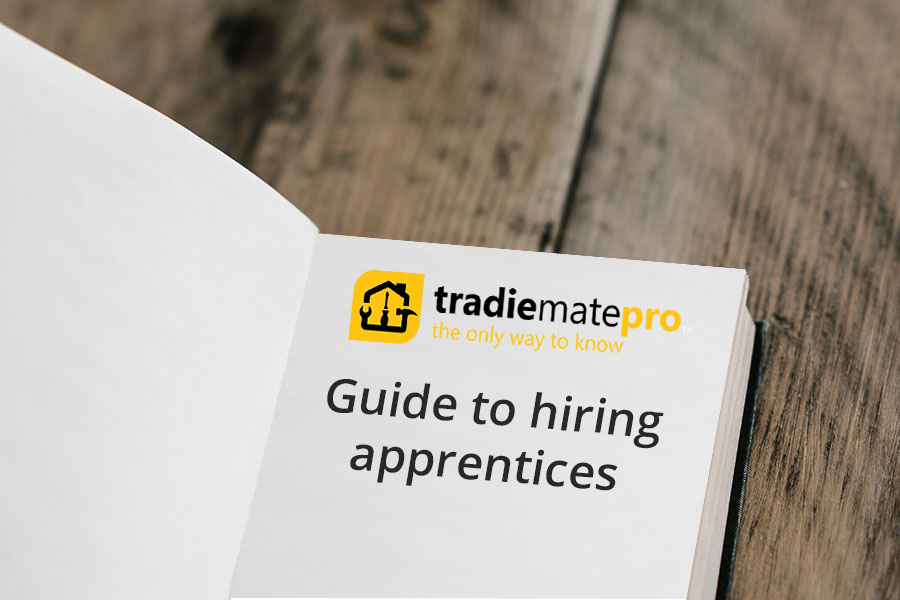Your business is only as good as the quality of your staff. Your earnings and your good name as a tradie are pinned to the services that your employees provide –not your marketing, and not your winning personality as an owner.
It makes sense, then, to keep your pool of talent fresh by taking on apprentices: young and inexperienced talent looking to hone their skills and work for very reasonable rates. That is, provided you make the right choice in a hire.
Since taking on the wrong apprentice can be a disastrous waste of time and money. It pays to know what steps you should take when hiring apprentices: from identifying the attitudes and skills you’re after, to screening them, and then finally to interviewing them.
We wrote this guide to give you the full scope of what it means to hire a trainee. Read on, and see how simple (and delicate) the process can be.
Why should you hire apprentices?
Before anything else, we need to talk about the benefits of hiring apprentices.
Right off the bat, you should know that taking on one or two apprentices can take a big load off of your senior employees, freeing them up for more important work. Instead of juggling a dozen tasks all at once, your senior employees can assign lighter work to an apprentice (for example, taking measurements or preparing tools). You can count on apprentices to pull their weight, provided they have ample opportunities to learn from your more experienced team members.
More important to the future of your shop, however, is the opportunity to train a dedicated workforce before they develop any useless or counterproductive habits. Apprentices are generally more willing to follow policy and adapt their behavior to suit your business’ needs than older workers in your industry. Need hard workers? Here’s your chance to train some.
Younger apprentices can also be very versatile. The younger members of today’s workforce are willing to work after hours and eager to lend their ideas for improving their workplaces. Some might perceive this as millennials overstepping their roles, but a successful business owner knows how to convert initiative into positive action.
The best part? All of this comes at a lower cost than hiring a standard employee.
Hiring apprentices: qualities to watch out for
As with any new employee, there are a number of qualities to look for in an apprentice. Unlike a manager or senior craftsman, however, these qualities speak more about how they think rather than what they can do.
Interest
If your prospective hires had a significant amount of working experience under their belts, then they wouldn’t be applying for an apprenticeship, would they?
While that might seem like common sense, many tradie business owners insist on prioritising experience when taking on their apprentices. Not only is this ironic, but it prevents tradies from reaping the true reward of hiring apprentices: the opportunity to start them on the perfect, workplace-specific habits.
In the absence of experience, some tradie business owners turn to their candidates’ motivations and put their confidence in prospective hires who are “in it for the money,” thinking it guarantees a minimum of compliance and responsibility. They’re right, which is what makes this a bad bet: you get what you pay for, but you can’t expect much more.
On the other hand, we have people who take a genuine interest in trade work and are undergoing their apprenticeship as a way to earn and as an opportunity to work in a field they’re passionate about. Studies show that a genuine interest accelerates learning and the quality of a person’s work.
In a nutshell, your best candidates when hiring apprentices are the ones who are motivated by a desire to spend time in the field, learning and contributing to a tradie business because it’s a tradie business.
Honesty
Honesty is a tricky value to pin down when hiring apprentices. It only shines under certain conditions, and most employers don’t see their hires’ trustworthiness until late in the game. That is, unless you’re willing to put your prospective hires through an elaborate lie detector test to vet their honesty –which, as a well-balanced person, you shouldn’t be.
Still, the value of a candidate’s word matters, which begs the question: How do I know if they’re bluffing?
When hiring an apprentice, the best way to gauge their honesty is to see how much they respect their work. If your new hire gives the impression that they recognize the responsibility that comes with the job, then you’re more likely to have someone trustworthy on your hands.
In the same way, you can count on a person who shows signs of wanting to contribute to your business not to rob you blind or hide their mistakes. This is part of the reason why we advise against hiring apprentices who are motivated solely by a paycheck –those who are happy to give are far more valuable than those who are happy to take.
We’ll cover more tips and tricks for interviewing your could-be apprentices in our section on interviewing candidates.
Teamwork
No matter what business you’re in, your employees should all be able to function as part of a team. Cohesion matters more than you think, even in a workforce with highly varied job descriptions. Your apprentices are no exception to this rule: when hiring apprentices, their willingness to work with others and contribute to a positive working environment should be a determining factor.
Things fall apart in the absence of a functioning team dynamic. Lines of communication among your staff members grow less clear, making it harder for your office to respond to emergencies and unforeseen situations (meaning you receive more calls during your off-hours). The workflow you’ve worked hard to perfect won’t save you either — teams that don’t work well together produce worse output.
You can spot a team player among your prospective apprentices by reaching out to their references. Past employers, past mentors, or even past educators would likely have something to say about their ability to function as part of a group. Beyond this, a simple attitude check works wonders: if they aren’t willing to sacrifice time or comfort for the sake of their own performance, odds are they would carry the same attitude when it comes to their coworkers.
Overlook these qualities at your own risk, and note that there are plenty more common values that could indicate a great hire. Maybe some values or priorities are of particular importance to your company as well. Whatever the case, treat these three as must-have qualities during the screening phase of hiring apprentices.
Hiring apprentices: red flags
Just as there are signs of a great potential hire, there are signs of a terrible one. Have a look through the following red flags, and think twice about hiring an applicant that comes bearing any of them.
Tardiness
Punctuality is critical to a tradie business. The rent won’t wait ‘til everyone’s present before costing you money, and your clients will be even less forgiving. Anyone who’s ever had to deal with a compulsive latecomer knows how hard it can be to instill greater discipline.
Don’t settle for anything short of professional behavior from your apprentices. Young or inexperienced though they may be, there’s no excuse for hiring apprentices who show a blatant disrespect for someone else’s time. If they’re willing to waste an employer’s time, they won’t think twice about wasting your customers’ time.
When a candidate is late in turning in required documents, or fails to arrive to an interview on time, make sure their reasons are valid. Do some fact-finding if you have to –if they think they can get away with an imagined sob story before their first day on the job, then they’re bound to treat you as a pushover once they’re in a position to waste your money.
Dependency
While an apprentice’s first job is to learn, there’s a line between a raw talent and an empty vessel. An apprentice without technical knowledge may prove useful down the line, but an apprentice who literally couldn’t tell between a Phillips and a flathead after you’d shown him the difference is a disaster waiting to happen.
Hired apprentices should be reasonably skilled upon hiring, and able to follow instructions without too much guidance. Remember: a good apprentice needs a manager, not a babysitter.

You can test for this by working some problem-solving challenges into your screening process. Ask your applicants to think their way through a hypothetical situation related to the job, and encourage them to ask questions as they do. This gives you an idea of what they can do right from the start, and more importantly, what measures they take when their skills and knowledge aren’t enough.
Arrogance
Jumping off our point on dependency, we have to point out that an inflated sense of competence is also a sign of a poor candidate. It’s great to hire apprentices who can present themselves with confidence and act with a fair amount of independence, but when they start showing an inordinate amount of self-certainty, you might want to proceed with caution.
Watch out for apprentices who oversell themselves, or at least sound like they’re overselling themselves. You can get a good sense of what they can do based on their application documents, and any specific training goals they’ve flagged for themselves.
Moreover, steer away from candidates who have a tendency to reject help or ask questions when faced with problems they aren’t equipped to solve. The greater the candidate’s eagerness to learn, the more you can count on them to make smart decisions when placed in situations where their performance can affect your business’ earnings or esteem.
As with our list of the top values for hiring apprentices, these red flags aren’t the only ones you should keep an eye out for. Be judicious when screening apprentices, but remember to be fair: think long and hard before letting a promising candidate go on account of one or two red marks on their file.
Hiring apprentices: The interview
When hiring apprentices, the interview isn’t only a critical step for them but for you as well. Ask the wrong questions, and you may find yourself turning your next star employee away, or hiring a months-long headache.
This section covers general tips and tricks when interviewing a candidate for an apprenticeship. Since we’re assuming you’ve had experience in hiring regular employees, we’ll cut straight to the specifics.
Aim for open-ended questions
To kick things off, it pays to remember why we run interviews when hiring apprentices: interviews are meant to get an insight into the way candidates think –not so much what they know.
The best interview questions are open-ended, meaning an answer of one or two words won’t make the cut. They give your candidates the opportunity to talk, which gives a smart hiring manager or business owner the chance to glean insights from their answers.
Close-ended questions are best saved for application forms and technical exams. Prepare these for the interview to give you a chance to see how they can explain concepts or techniques they should already know, and to see how they can reason through what they don’t.
Expect nerves
Most people who apply for an apprenticeship don’t have the luxury of previous working experience, so expect most of them to arrive with some form of the jitters.
Rather than taking some mild nervousness against your candidates, try your best to put them at ease so you can get to more important matters: scanning for their qualities and crossing off potential deal-breakers. The anxiety of a new job fades over time, but you can never make up for potential you wasted by turning down a great hire.
Now, if their nerves are so bad that they keep you from discovering any useful insights on them, then you can reasonably factor it into your decision to take them on board.
Get to know them
The values we mentioned at the beginning of this article are difficult to assess in the context of an interview. It’s hard to tell genuine attitudes apart from the sort of posturing that goes on when facing a potential employer.
As a neat trick for your interviews, schedule any technical questions for the opening portions of your interview and then spend some time getting your applicants to relax. Invite them to share stories of their experiences, play the role of someone who’s simply interested in learning about them (while maintaining professionalism, of course), and see what attitudes you can guide them into revealing.
It takes a bit of time and effort on the part of the interviewer, but trust us when we say you’d prefer this to hiring apprentices who prove to be liabilities down the road.
Conclusion
There are two concise ideas that capture the essence of hiring apprentices who are good for keeping your business highly productive and populated with talent.
First, rise to the challenge of retaining your apprentices after they’ve learned the skills they’re after. There’s no guarantee they’ll commit to staying past their time with you, but it helps to position yourself as a great employer, your workplace as a great environment, and your salary offer as a great rate.
Second, give your apprentices ample opportunities to learn. By all means, hold them responsible for pulling their own weight; however, you’re doing them a disservice by refusing to let them pick up the skills they’re after. Their improvement can only mean better things for your business, after all.
Hiring apprentices can be a delight when you know what you’re getting into. Don’t miss out on the chance to infuse new talent into your business, and make room for some raw talent today.













